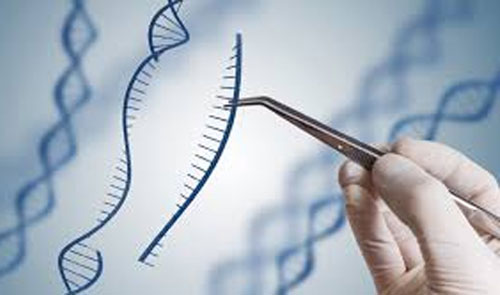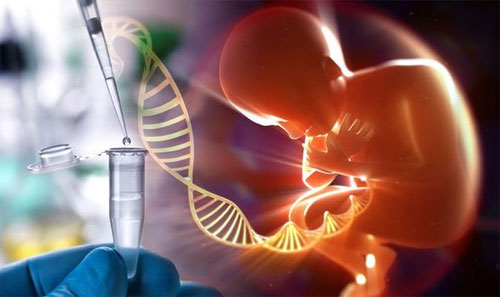How genetic engineering will reshape humanity (1)
A book excerpt and interview with Jamie Metzl, author of “Hacking Darwin”
New genetic technologies are exhilarating and terrifying. Society might overcome diseases by tweaking individual genomes or selecting specific embryos to avoid health problems. But it may also give rise to “superhumans” who are optimised for certain characteristics (like intelligence or looks) and exacerbate inequalities in society.

What is certain is that people will be able to make decisions about their lives in ways that were impossible in the past, when we relied more on random evolution than deliberation. In the words of Jamie Metzl, we are “Hacking Darwin,” the title of his latest book. It is a thoughtful romp through new genetic technologies, with insights on what it means for individuals, society and even great-power politics.
The theme draws together discrete strands of Mr Metz’s diverse background. He’s worked for the United Nations on humanitarian issues in Cambodia and served on America’s National Security Council under President Bill Clinton. He’s been an executive at a biotechnology company, a partner at large investment fund in New York and a candidate for Congress from Missouri. But perhaps even more relevantly, he is the author of two sci-fi novels on genetics, “Genesis Code” and “Eternal Sonata.”
As part of The Economist’s Open Future project, they asked Mr Metzl about genetic engineering, inequality and the new “liberal agenda”. Below the interview is an excerpt from his book, on the history of eugenics.
The Economist:
What are the ways in which people are able to “hack Darwin” today and over the next 15 years or so?
Jamie Metzl: We have always fought against the inherent cruelty of natural selection, one of the two essential pillars of Darwinian evolution. We are now beginning to hack away at the second pillar, random mutation. Our growing understanding of how genes and biology function is opening the door to incredible medical applications like using genome sequencing and gene therapies to fight cancer and other diseases. But the healthcare applications of genetic technologies are only a station along the way to where these technologies are taking us.
Our ability to select embryos during in vitro fertilisation (IVF) – based on informed genetic predictions of both health-related traits and intimate characteristics like height, IQ and personality style – will grow over the coming years. We’ll use stem cell technologies to expand the number of eggs that prospective mothers can use in IVF and therefore the range of reproductive options for parents. We’ll deploy gene editing tools far more precise than today’s CRISPR systems to make heritable genetic changes to our future offspring.
Over the coming decades, Darwin’s original concept of random mutation and natural selection will gradually give way to a process that is far more self-guided than anything Darwin could have imagined.
The Economist:
Changing the nature of what it means to be human has huge consequences. What are the main ones?
Mr Metzl: We have internalised the idea that information technology is variable, which is why we expect each generation of our phones and computers to be better than the last. It’s harder for us to come to grips with the idea that our biology could be as variable as our IT, even though we understand intellectually that somehow we evolved from single cell organisms to complex humans over the past 3.8 billion years.
Starting to see all of life, including our own, as increasingly manipulable will force us to think more deeply about what values will guide us as we begin altering biology more aggressively.
If we want to avoid dividing our species into genetic have and have-nots – a dangerous reduction in our diversity – or a genetic determinism that undermines our humanity, we’ll need to start living our values. But though we need to be mindful of the dangers, we must also keep in mind that these technologies have the potential to do tremendous good. Someday they might well help us avoid extinction level events like dangerous synthetic pathogens, a warmer climate, the fallout from a nuclear war or the eventual expiration of our sun.
The Economist:
Do we have the ethical framework to handle this? If not, what might it look like if things go wrong?
Mr Metzl: We create beautiful art, philosophy and universal concepts like human rights but wipe out millions of each other in wars and genocides and still today invest massive amounts of our collective wealth in tools of mass murder.
The “better angels of our nature” remain primary drivers in our development of genetic technologies, but the dark side of human nature could also be empowered through these same tools. We need a very strong ethical and cultural framework to increase the odds that we’ll use these technologies wisely, not least because access to them will be decentralised and democratised.

Although the positive possibilities far outweigh the negatives, it would be crazy to ignore the many ways things could go wrong. Like Icarus, we could fly too close to the sun and get burned if we hubristically assume we know more than we actually do. Our gene drives could crash ecosystems. We could use these tools to undermine our common identity as a species and social cohesion. The good news is that while the technologies are new, the values we’ll need to use them wisely are often old.
The Economist:
What sort of regulations need to be in place to “enable” these technologies – and what rules should “constrain” them?
Mr Metzl: Genetic technologies touch the source code of what it means to be human and must be regulated. This job is all the more difficult because the technology is racing forward faster than the governance structures around them can keep up. On both the national and international levels, we’ll need enough governance and regulation to prevent abuses and promote public safety while not so much to impede beneficial research and applications.
To avoid dangerous medical tourism, every country should have a national regulatory system in place that aligns with international best practices and the country’s own values and traditions. We also have to start developing global norms that can ultimately underpin flexible international standards and regulations.
These systems must be guided by core values rather than inflexible rules because what may now seem unthinkable, like actively selecting and even editing our future offspring, will increasingly become normalised over time. We urgently need to start preparing for what is coming.
The Economist:
This takes the issue of human liberty to a new level (people should be free to change themselves or offspring), as well as the potential for unbridgeable inequalities (not just of wealth or life outcomes, but of capabilities encoded in oneself and family). How must the idea of liberalism adapt to address this? What does the “liberal agenda” look like for the 21st century vis-à-vis “hacking Darwin”?
Mr Metzl: If and when it becomes possible for some parents to give their children enhanced IQs, lifespans and resistance to disease, we will have to ask what this means for everyone else. Some will see these parents as first-adopters paving the way for everyone else, like the first privileged people buying smartphones. Others will call them usurpers laying the foundation for dangerously divided societies.
Whatever the case, differences within and between societies, fuelled by competition, will drive adoption of these technologies and present societies with stark choices. Too few regulations could lead to a dangerous genetic engineering free-for-all and arms race. But trying to ban genetic manipulations would increasingly require the trappings of the most oppressive police states. Some liberal societies may choose to provide a basic level of access to assisted reproduction and genetic-engineering services to everyone, not least to save the expense of lifetime care for people who would otherwise be born with preventable genetic diseases.

Societies already struggling to define the balance between the parental and state interests in the context of abortion will have an even tougher time drawing this line for parent-driven assisted reproduction. But if we thought the debates over abortion and genetically modified crops were contentious, wait until the coming debate over genetically modified people arrives. If we don’t want this to tear us asunder, we must all come together in a public process to figure out the best ways forward.
The disgraceful history of eugenics
Excerpted from “Hacking Darwin: Genetic Engineering and the Future of Humanity” by Jamie Metzl (Sourcebooks, 2019)
“The term eugenics combines the Greek roots for good and birth. Although coined in the nineteenth century, the concept of selective breeding and human population culling has a more ancient history. Infanticide was written into Roman law and practiced widely in the Roman Empire.
‘A father shall immediately put to death,’ Table IV of the Twelve Tables of Roman Law stated, ‘a son who is a monster, or has a form different from that of the human race.’ In ancient Sparta, city elders inspected newborns to ensure that any who seemed particularly sickly would not survive. The German tribes, pre-Islamic Arabs, and ancient Japanese, Chinese, and Indians all practiced infanticide in one form or another.
The 1859 publication of Darwin’s The Origins of Species didn’t just get scientists thinking about how finches evolved in the Galapagos but about how human societies evolved more generally. Applying Darwin’s principles of natural selection to human societies, Darwin’s cousin and scientific polymath Sir Francis Galton theorized that human evolution would regress if societies prevented their weakest members from being selected out.
In his influential books Hereditary Talent and Character (1885) and then Hereditary Genius (1889), he outlined how eugenics could be applied positively by encouraging the most capable people to reproduce with each other and negatively by discouraging people with what he considered disadvantageous traits from passing on their genes. These theories were embraced by mainstream scientific communities and championed by luminaries like Alexander Graham Bell, John Maynard Keynes, Woodrow Wilson, and Winston Churchill.
Although his work was partly in the spirit of the Victorian England times, Galton was then and even more now what we would call a racist. ‘The science of improving stock,’ he wrote, ‘takes cognizance of all the influences that tend in however remote degree to give the more suitable races or strains of blood a better chance of prevailing speedily over the less suitable than they otherwise would have had.’”
Read the second part of the article
yogaesoteric
November 5, 2019
